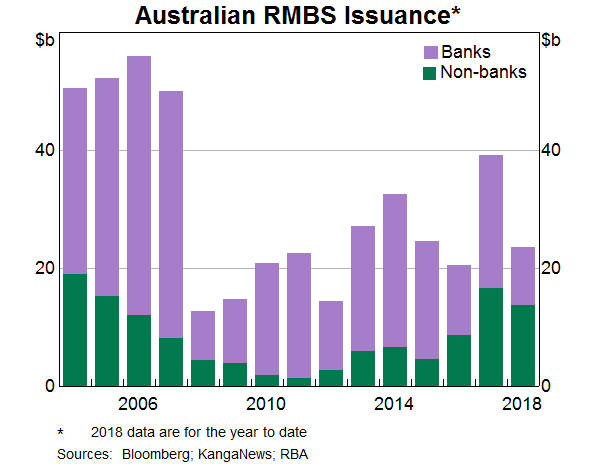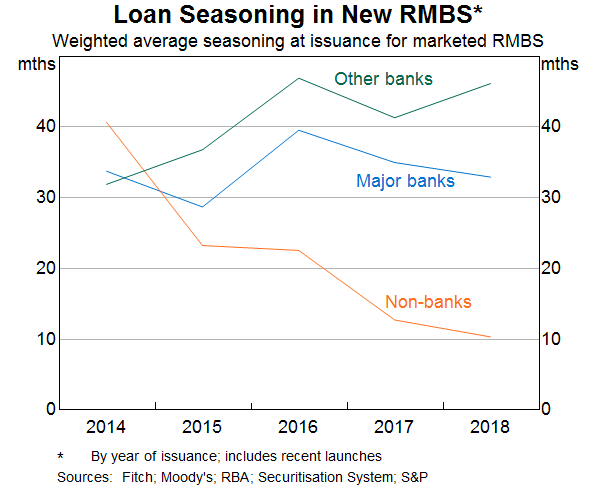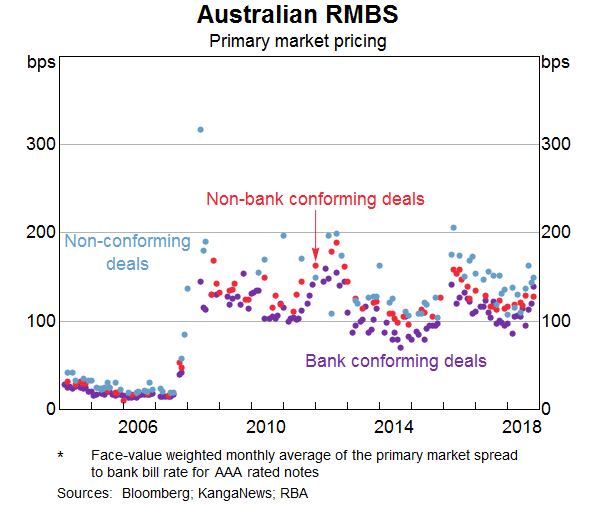The Great RMBS Short
One of our best “short” (as opposed to “long”) ideas this year has been to bet that the credit spreads on residential mortgage-backed securities (RMBS) would widen—reducing their price—as a function of the toxic combination of falling house prices, rising defaults, surging supply and plummeting home loan prepayment rates. (We largely exited our RMBS holdings in February 2018.) You can read my full column here or AFR subs can click here. Excerpt below:
We have particularly warned that the subordinated, or junior-ranking, tranches of recent RMBS issues with little-to-no loan “seasoning”, which have been popular with unsophisticated investors, were at risk of credit rating downgrades as house price declines tracked to our early 2017 forecast of a national peak-to-trough fall of circa 10 per cent.
In the last week both the RBA and, belatedly, Standard & Poor’s have rung similar alarm bells. The RBA’s Christopher Kent highlighted that RMBS issuance volumes have risen to their highest levels since before the global financial crisis on the back of a rebound in non-bank lending to borrowers that cannot get credit from banks, which has been partly funded by demand for these securities from overseas investors. (We outlined the prospect of a resurgence in non-bank lending via improved RMBS liquidity in April 2016.)
In 2011 non-bank deals made up less than 10 per cent of all RMBS transactions—today that number is north of 60 per cent. A key enabler of this new competitive force has been Japanese banks. Since 2017 these institutions have been eager buyers of our RMBS, although the worry is that the big tickets have been written by a handful of investors that could step to the sidelines if housing conditions deteriorate further.
Kent also cited another concern ventilated by this column, which is the extraordinarily poor seasoning in the non-bank RMBS deals launched this year as lenders scramble to grab investors’ cash while it is still there. Whereas in 2014 the average age of the loans in both bank and non-bank RMBS deals was between 30 and 40 months (previous house price appreciation enhanced the value of the collateral protecting these mortgages), in 2018 the seasoning in non-bank transactions has plunged to just a few months.
This is diabolical in an environment where home values are melting. Both the average loan-to-value ratio (LVR) of the loans underpinning an RMBS deal will increase (reducing the equity protecting investors) as will the portfolio’s exposure to very high risk loans with less than 10 per cent equity (or LVRs over 90 per cent).
To quantify the magnitude of this hazard, I had my data scientists revalue the 42 most recent RMBS issues. They marked-to-market each deal’s weighted-average LVR based on the change in house prices since its underlying loans were originated (using CoreLogic’s data on a state-by-state basis). We found 21 bonds where the portfolio LVR had climbed even after accounting for the pay-down, or amortisation, of the mortgages backing it. All these deals came from non-banks rather than banks.
My team then quantified whether there were any bonds where the portfolio exposure to ultra high-risk loans with LVRs above 90 per cent had increased (it should fall as principal is repaid). They discovered 12 deals where this was the case (after factoring in amortisation), including some very large jumps. In particular, there were five recent RMBS issues with large portfolio weights to Sydney where the share of loans with LVRs over 90 per cent had leapt by 6 percentage points or more. In one example the bond’s overall exposure to this troublesome cohort rose from less than 10 per cent when the deal was sold to investors to almost 19 per cent today.
Another interesting question is whether there are any interest-only borrowers within these transactions that have moved into “negative equity” (ie, where the value of the loan exceeds the price of the property). The RBA's Kent stressed that non-banks have significantly boosted their lending to investors as banks have pulled-back from this sector. Because of the tax deductibility of interest repayments on an investment loan, it is more common for these borrowers to use a non-amortising interest-only product than an owner-occupier.
In a situation where house prices are falling fast, interest-only borrowers have a much greater chance of finding themselves underwater than owner-occupiers (given the absence principal repayments). By updating the portfolio LVRs with the house price changes since the loans were originated, my quant team identified four recent RMBS transactions where it appears there are interest-only borrowers that have moved into negative equity.
In August I highlighted the paradox that whereas the credit spreads on the safest, or highest-ranking RMBS tranches, had been moving sideways or drifting wider, spreads on the riskier, or lower-ranking, tranches popular with less sophisticated investors continued to compress as the search for yield dynamic overwhelmed weakening fundamentals.
Thankfully this dichotomy has resolved itself: spreads on all RMBS tranches are now expanding as the market has woken up to the declining credit quality. Earlier in the year it was common for new deals to be heavily oversubscribed and indicative launch spreads tightened—now transactions are struggling to get away. And I would not be surprised to see the all-important overseas bid dilute or disappear when these investors realise that the quality of the assets they are holding is declining materially.



3 topics

